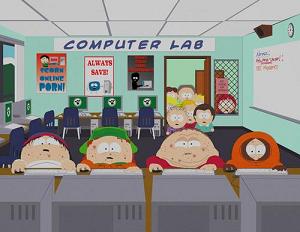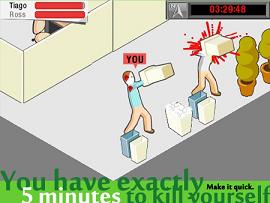[Is it possible that the rise of the Evil Casual Gaming Empire isn’t such a bad thing after all? Casual Difficulty considers the effects—both good and bad—that casual gaming has had on hardcore gamers. Think of this semi-regular column as a peace pipe extended from our gnarled FPS-worn hands to the soft, innocent hands of our casual brethren and sistren. In this Casual Difficulty, a look at game length.]
I recently played through Platinum Games’ new, destined-to-be-cult-classic title Vanquish. As much as I loved it, the game is drawing major ire from gamers for only lasting 4-6 hours while still costing a full $60. This got me thinking seriously about how we consider a game’s length.
Long games no longer dominate the market. The beefy 20-hour FPS games of yesteryear have been reduced to svelte 5-hour story arcs—usually supplemented by multiplayer modes that provide a series of adrenaline-infused 10-minute matches. And two of the most “epic” RPGs of this generation, Fallout 3 and Mass Effect 2, can easily be completed in a slender (for RPGs, at least) 30 hours.
There are a lot of possible reasons for this change: skyrocketing production budgets, changing audience demographics, proliferation of mobile gaming platforms, increased interest in multiplayer competition, and so on. Perhaps a little history is in order.
Once upon a time, before the death of the arcades—everywhere, that is, except in Japan (apparently arcade cabinets in Japan consume the blood of newborn children in order to live forever)—a game lasted only as long as your quarter did. Games were deliberately challenging and short in order to convince you to pop in more and more quarters to keep playing.
But when home consoles killed off the arcades over the course of the 1990s, game design started turning more toward long, narrative-driven experiences. And once consoles started using CDs instead of cartridges in the late ‘90s, discs became crammed full of storage-heavy pre-rendered cinematic sequences, exposition-laden voice work, and more level assets than most games knew what to do with. From then on out, budgets started escalating, development teams started growing, and games kept getting longer and longer.
This isn’t to say that long games didn’t exist before then. There were plenty of massive, story-driven RPGs made throughout the 1980s on PC. But they weren’t the norm. Not until console gaming and CD technology combined in the mainstream did long games become something that seemingly every gamer wanted.
 But we’ve recently come to an impasse in the industry where making long games has become too expensive, and a whole other side of the industry has opened up that thrives on cheaper, more profitable, ultra-short games. Meanwhile, we veteran gamers seem to want more hours-per-dollar-spent from our games than ever before.
But we’ve recently come to an impasse in the industry where making long games has become too expensive, and a whole other side of the industry has opened up that thrives on cheaper, more profitable, ultra-short games. Meanwhile, we veteran gamers seem to want more hours-per-dollar-spent from our games than ever before.
This brings me back to Vanquish. Even if I had no intention of ever replaying the game, why does its length matter? Can I—or should I—quantify my enjoyment in dollars? Would it be a “better” experience if it were two or three hours longer?
Many publishers and game designers have looked for alternatives to making long games, mostly by adding under-developed multiplayer and challenge modes. And a whole new crop of casual game developers are looking to the old arcade model for new ways to design game experiences. I mean, what are micro-transactions and DLC if not the modern-day version of dropping quarters into an arcade slot?
Part of me is drawn to this new way of making and playing games. Hell, Sesame Street was originally developed in the 1970s under very similar circumstances, using extremely short and varied mini-programming to keep kids’ interest through a full hour. It’s no coincidence that mini-game collections like WarioWare look so much like Jim Henson’s revolutionary show. At the same time, another part of me very much misses the slow build-up of older FPSs and RPGs from the ‘90s. That cranky old man in me is convinced no one has patience anymore for the more serious, thoughtful games from 10-20 years ago.
But either way, the complaint over the “shortness” of recent games like Enslaved and Vanquish is missing the point. What these complaining gamers want is a game they can play through once, be done with, get rid of, and move on to the next one. Many of us have been lured into that 1990s-era mentality where games had big budgets and big narratives, a time when games were designed to be played once and then discarded (which is also not coincidentally when the used games market began to spread like wildfire).
If nothing else, the shorter campaigns and tighter narratives of modern games should help convince us to slow down and smell the pixilated roses from time to time. Games look nicer, control more tightly, and probably even smell better than they ever have before; there’s a lot you’re probably missing if you’re just playing a game to speed through it and move on to the next one.
 I’ve put more hours into my $10 XBLA copy of Ikaruga than into any $60 game I’ve played over the past five years, and I’m lucky if I can last fifteen minutes in that beast of a game (without continuing, natch). What keeps me coming back aren’t the leaderboards, since I don’t have a holy chance in bullet hell of ever coming close to those shmup gods at the top of the boards. It’s simply the pure fun of a brilliant game designed with loving attention to technical and visual detail that has kept my interest for so long.
I’ve put more hours into my $10 XBLA copy of Ikaruga than into any $60 game I’ve played over the past five years, and I’m lucky if I can last fifteen minutes in that beast of a game (without continuing, natch). What keeps me coming back aren’t the leaderboards, since I don’t have a holy chance in bullet hell of ever coming close to those shmup gods at the top of the boards. It’s simply the pure fun of a brilliant game designed with loving attention to technical and visual detail that has kept my interest for so long.
Anyone who’s been reading my columns and reviews over the years probably knows by now how often I compare games to food. This column is no exception since I see a direct correlation between how we consume food and how we consume games. For example, over the past decade, there’s been a broad movement among restaurants and home chefs toward “slow food”, a reaction against the fast food and instant meals of the past fifty years. Rather than instant gratification and convenience, these chefs and home cooks are finding ways to immerse themselves in the love of food and the cooking process.
I wonder if we might not be able to apply the same principles to gaming. Rather than gorging ourselves on super-sized games that we ravenously consume and quickly forget about, what if we instead committed ourselves to “slow games”?
Achievements, Trophies, and unlockables might seem to have helped us learn to slow down, but instead these may just be worsening our seemingly insatiable appetites. We consume Trophies just as thoughtlessly and compulsively as we do the games themselves. In contrast, “slow gaming” would mean simply playing and replaying a game for the pure joy of it, no matter its length and with no particular goal in mind. Considering how many years and how many millions of dollars go into designing a single game, it’s hard to imagine that we couldn’t get more out of our games than what we experience in a single play-through.
If you’re anything like me, you see a real value in the games we play that puts them on par with other important creative media like film and literature. That’s why I find it so disheartening when I hear people complaining about how “short” a game like Vanquish is. If games are so culturally significant, why do we insist on evaluating them based on how “filling” they are?
If a game’s not worth savoring, is it really worth consuming?







